
June 11
1880 Jeannette Rankin born: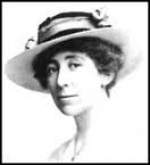
Jeannette Pickering Rankin, the first woman ever elected to Congress, is born on a ranch near Missoula, Montana Territory.
Rankin was a social worker in the states of Montana and Washington before joining the women's suffrage movement in 1910. Working with various suffrage groups, she campaigned for the women's vote on a national level and in 1914 was instrumental in the passage of suffrage legislation in Montana. Two years later, she successfully ran for Congress in Montana on a progressive Republican platform calling for total women's suffrage, legislation protecting children, and U.S. neutrality in the European war. Following her election as a representative, Rankin's entrance into Congress was delayed for a month as congressmen discussed whether a woman should be admitted into the House of Representatives.
Finally, on April 2, 1917, she was introduced in Congress as its first female member. The same day, President Woodrow Wilson addressed a joint session of Congress and urged a declaration of war against Germany. On April 4, the Senate voted for war by a wide majority, and on April 6 the vote went to the House. Citing public opinion in Montana and her own pacifist beliefs, Jeannette Rankin was one of only 50 representatives who voted against the American declaration of war. For the remainder of her first term in Congress, she sponsored legislation to aid women and children and advocated the passage of a federal suffrage amendment.
In 1918, Rankin unsuccessfully ran for a Senate seat, and in 1919 she left Congress to become an important figure in a number of suffrage and pacifist organizations. In 1940, with the U.S. entrance into another world war imminent, she was again elected as a pacifist representative from Montana and, after assuming office, argued vehemently against President Franklin D. Roosevelt's war preparations. On December 7, 1941, the Japanese attacked Pearl Harbor, and the next day, at Roosevelt's urging, Congress passed a formal declaration of war against Japan. Representative Rankin cast the sole dissenting vote. This action created a furor, and Rankin declined to seek reelection. After leaving office in 1943, Rankin continued to be an important spokesperson for pacifism and social reform. In 1967, she organized the Jeannette Rankin Brigade, an organization that staged a number of highly publicized protests against the Vietnam War. She died in 1973 at the age of 92. (History.com)

1915 World War I: List Regiment: Gefreiter Adolf Hitler's 16 Reserve Infantry Regiment continues to occupy a position at Fromelles—pictured above in a drawing by Hitler—which is on a level field with water channels, willow trees and willow stalks, in the distance towards the enemy lines lie an insignificant wood with barbed wire entanglements. Under the direction of their defense-minded commander, Lieutenant General Gustav Scanzoni von Lichtenfels, the regiment works ceaselessly day and night to further fortify their position at Fromelles while fighting off repeated assaults by the enemy. [For further details, Click here.]
1916 World War I: List Regiment: Gefreiter Adolf Hitler continues to endure trench warfare in Flanders (Artois) with 3 Company, 16 Reserve Infantry Regiment. [For further details, Click here.]
1917 World War I: Various:
List Regiment: Gefreiter Adolf Hitler's 16th RIR remains east of Douai for a period of rest which will extend until June 24. [For further details, Click here.]
Greece: Allied Ultimatum to King Constantine I:

The protecting powers of Greece have decided to reconstitute the unity of the kingdom without impairing the monarchical constitutional institutions that they have guaranteed to Greece. His Majesty King Constantine, having manifestly on his own initiative violated the Constitution of which France, England, and Russia are the trustees, I have the honor to declare to your Excellency that his Majesty the King has lost the confidence of the protecting powers, and that the latter consider themselves free toward him from the obligations resulting from their right of protection. I have in consequence the mission, with a view of re-establishing the real Constitution, to ask for the abdication of his Majesty King Constantine, who will himself designate, together with the protecting powers, a successor among his heirs. I am under the obligation to ask from you an answer within twenty-four hours.
1918 World War I: Various:
Allied counter-attack in France:
After several months of an aggressive German offensive on the Western Front during the spring and early summer of 1918, the Allies begin their counterattack, including an assault on June 10, 1918, by four French and two American divisions on German lines near the town of Antheuil-Portes in central France, some 45 miles from Paris.
Code-breaking by French intelligence at the beginning of June 1918 had allowed the Allies to prepare for a German attack in France that was to begin at midnight on June 7. The French launched their own massive artillery bombardment some ten minutes earlier, catching the Germans while they were still preparing for the attack. The Germans countered with an even stronger assault, firing 250,000 rounds of poison gas—including mustard, phosgene, and diphenyl-chlorarsine—into the French trenches, incapacitating some 4,000 French soldiers, and killing 32.
After three days of battle, the Germans had forced the French back to Antheuil-Portes. Winston Churchill, in Paris at the time coordinating Allied munitions, wrote to his wife on June 10 that "If the French cannot hold [the Germans] back on this sector, it is not easy to see what the next step on our part should be." The following day, four French and two American divisions launched a counterattack aided by significant air support as well as over 150 tanks. They successfully pushed the Germans back from Antheuil, taking more than a thousand German prisoners. A German attack west of Soissons on June 12 made negligible gains, and German Chief of Staff Erich Ludendorff called off the offensive that same day. The Allies continued their push, however, beginning a change of momentum that would gain force throughout the summer of 1918 and the final months of World War I. (History.com)
List Regiment (June 1-17): The 16th RIR continue to hold the Front at Aisne and the Marne. [For further details, Click here.]
1927 Lindbergh:
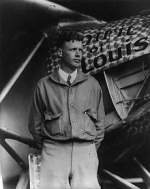
When 25-year-old Charles A. Lindbergh set down his monoplane, The Spirit of St. Louis, at Le Bourget Aerodrome in Paris on May 21, 1927, he instantly became the leading hero of a decade of American heroes and celebrities. Lindbergh had not expected any welcome in France, but word of his arrival spread through Paris, and twenty-five thousand people surrounded the plane even before he stopped taxiing.
The frenzy continued when Lindbergh returned to the United States on June 11, 1927, where President Calvin Coolidge and his wife welcomed him at a Washington Monument stand specially built for the occasion. Coolidge's welcome and Lindbergh's brief response were broadcast nationwide. Coolidge lavished praise on the aviator in a very serious voice, and Lindbergh responded humorously. Beneath the joking about a battleship being sent for him, however, was perhaps a serious concern about becoming a prisoner of his sudden fame.
1932 Weimar: Various:
SA and SS: The German government lifts the ban.
The SS (Schutzstaffel, German for "Protective Squadron")was the primary bodyguard of Adolf Hitler and the Nazi Party's "Shield Squadron" much like the Praetorian Guard of the Roman Empire. In 1936 under the command of Heinrich Himmler, it expanded and was responsible for the operations of the Concentration Camps and eliminating "enemies of the state" (Communists, Jews, etc.)
The SA (Sturmabteilung, German for "Stormtroopers") also referred to as "Brownshirts", were Hitler's paramilitaries and were of key importance in Hitler's rise to power in the 1930s. With Ernst Röhm in command they often made attacks and raids on other political parties, particularly the communists and during elections they would surround the building to intimidate the voters to vote for the Nazis. They murdered political opponents and terrorized voters.
June-July: Nearly 500 pitched battles take place between Nazis and Communists in Prussia alone. At least 82 people are killed and 400 wounded. (THP)
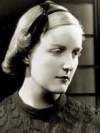
1933 Unity Mitford joins the British Union of Fascists. [For further details, Click here]
1937 USSR: Great Purge:

The Soviet "Generals' Trials," the third Stalinist purge trial, opens in Moscow. [For further details, Click here]
[See: Worst Dictator of Modern Times: Hitler or Stalin?]1938 Battle of Wuhan begins:
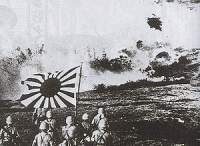
It will last four and half months, the longest and largest battle of the entire Second Sino-Japanese War. [For further details, Click here]
1939 Royal Visit:
MENU FOR PICNIC AT HYDE PARK
Sunday, June 11, 1939
Virginia Ham
Hot Dogs (if weather permits)
Smoked Turkey
Cranberry Jelly
Green Salad
Rolls
Strawberry Shortcake
Coffee, Beer, Soft Drinks
The King and Queen of England are in America to visit with the President and First Lady. As is befitting of such a grand event, the King and Queen are fed some of the gourmet foods of the United States; the first time a British Monarch consumes hot dogs.
1940 World War II: Various:
France: Paris is declared an "open city":

German soldiers in Paris
The Germans launched a major offensive on Paris on 9 June, and on 13 June Paris was declared an open city, as the French government fled to Bordeaux. The first German troops entered the French capital on 14 June, little more than a month after the campaign began. [For further details, Click here]
Churchill returns to France and meets Reynaud at Briare:
The British are determined not to allow the Germans to capture the French fleet and are prepared to use force against their ally.
Church and Reich: Cardinal Eugene Tisserant, a high official of the Vatican library, writes to Cardinal Suhard, Archbishop of Paris, that "our superiors do not want to understand the real nature of this conflict." Tisserant says he has pleaded with Pope Pius XII, without success, to issue an encyclical, but "I fear that history will reproach the Holy See with having practiced a policy of selfish convenience and not much else." (THP)
Italy: Britain strikes back:
Britain demonstrates that it will not remain on the defensive, by bombing Italian targets in response to Mussolini's declaration of war on England and France.
Having already marked out an offensive strategy in the event of Italian aggression, Britain bombed targets within the cities of Genoa and Turin. Africa was also another theater of conflict, as Italy and Britain were imperial neighbors. Italy had just bombed targets in the British-controlled Suez Canal territory, as well as the British-controlled island of Malta, in the Mediterranean. Britain retaliated with a raid on the Italian military installation in Eritrea. Even the Pacific would see fallout from this new conflict, with an Australian merchant cruiser giving chase to an Italian vessel, which ended up scuttling itself rather than surrendering. (History.com)
Franklin D. Roosevelt decries Italy's announcement of war with France, saying, "The hand that held the dagger has struck it into the back of its neighbor."
Polish government-in-exile moves from France to London after the defeat of France.
Resistance: The Kreisau Circle:
The von Moltke House at Kreisau
The Kreisau Circle, an anti-Nazi group led by Count Helmuth von Moltke, is founded to discuss the political, economic, and spiritual foundations of Germany that would arise after the downfall of Hitler. Jesuits Augustinus Raesch and Alfred Delp are both active members. (THP)
From a letter from Grand Admiral Erich Raeder to the German Navy:
The most outstanding of the numerous subjects of discussion in the Officers Corps are, for the time being, the torpedo positions and the problem whether the naval building program, up to autumn 1939, envisaged the possibility of the outbreak of war as early as 1939, or whether the emphasis ought not to have been laid, from the first, on the construction of U-boats . . . .
If the opinion is voiced in the Officers Corps that the entire naval building program has been wrongly directed and if, from the first, the emphasis should have been on the U-boat weapon and after its consolidation on the large ships, I must emphasize the following matters: The building up of the fleet was directed according to the political demands, which were decided by the Fuehrer. The Fuehrer hoped, until the last moment, to be able to put off the threatening conflict with England until 1944-45. At that time the Navy would have had available a fleet with a powerful U-boat superiority and a much more favorable ratio as regards strength in all other types of ships, particularly those designed for warfare on the High Seas. The development of events forced the Navy, contrary to the expectation even of the Fuehrer, into a war which it had to accept while still in the initial stage of its rearmament. The result is that those who represent the opinion that the emphasis should have been laid from the start on the building of the U-boat arm appear to be right.
I leave undiscussed how far this development, quite apart from difficulties of personnel, training, and dockyards, could have been appreciably improved in any way in view of the political limits of the Anglo-German Naval Treaty. I leave also undiscussed, how the early and necessary creation of an effective air force slowed down the desirable development of the other branches of the forces. I indicate, however, with pride, the admirable and, in spite of the political restraints in the years of the Weimar Republic, far-reaching preparation for U- boat construction, which made the immensely rapid construction of the U-boat arm, both as regards equipment and personnel, possible immediately after the assumption of power.
German Foreign Office Memorandum:
The Lithuanian Minister called on me today to inform me of the further progress of the discussions with the Soviet Union. After the Soviet Union had raised the question of the safety of the Soviet garrisons in Lithuania and had rejected the suggestion for a mixed commission to investigate the incidents, the Lithuanian Government had of its own accord taken a series of measures which it thought would satisfy the Soviet Union. It might perhaps be admitted that relations between the Soviet garrisons and the Lithuanian population had earlier been treated too casually. Restrictive and control measures had now been taken, and many arrests and house searches made, etc.
It was known that no reply was received to the Lithuanian suggestion of sending the Foreign Minister to Moscow. It was, therefore, all the more surprising that not the Foreign Minister but Minister President Merkys was summoned to Moscow. On June 7 Merkys had had his first conversation with Molotov. The latter had reproached him severely regarding the safety of the Soviet garrisons and in this connection presented a great many detailed incidents. Molotov had in particular maintained persistently that Butayeff, a member of the Red Army, who according to Lithuanian reports had committed suicide, had been shut by Lithuanians. He had expressed his dissatisfaction very plainly and stressed that the Lithuanian Ministry of the Interior was not equal to its task.
In a subsequent conversation on June 9, Molotov had brought up questions of foreign policy, which had increased Lithuanian fears regarding the course of the conversations. Molotov had maintained that a military alliance existed between the three Baltic States and as proof had referred to the frequent meetings of the chiefs of staff of the three countries and to other frequent conferences between Baltic personalities. Merkys had replied that there existed neither secret nor open agreements which could violate the letter or the spirit of the Agreement of October 10, 1939. There was the old political treaty between the Baltic States but no military alliance. Merkys had then himself expressed the wish to invite the Foreign Minister to the conversations. The latter had arrived in Moscow yesterday afternoon. Herr Skirpa had not yet received any more recent reports. From the standpoint of protocol, everything had taken place in very polite form. The Lithuanian Government still did not know what the intentions of the Soviet Union might be. The Lithuanian Government was prepared to do even more for the safety of the garrisons than it had done so far. If the Soviet Union now made broader political or military demands, the Lithuanian Government could not take the responsibility for their acceptance.
Thus far, the subject of Lithuania's relations with Germany had not been discussed during the foreign policy conversations. However, it was no doubt to be expected that the Soviet Union would raise questions in this respect, too. Here I interjected that there was nothing in German-Lithuanian relations which was not or should not be known by the Soviet Union. Herr Skirpa asked whether we had not instructed our Ambassador in Moscow to make inquiries. I replied in the negative and avoided further discussion of the matter with the remark that our Ambassador would certainly make a report of his own accord."
1941 World War II: Various:
Hitler issues Directive # 32: It begins with a flat statement: "After destruction of the Soviet Armed Forces, Germany and Italy will be military masters of the European Continent, with the temporary exception of the Iberian Peninsula. No serious threat to Europe by land will then remain." (THP) War in the Air: Twenty consecutive raids by the RAF begin, against targets in the Ruhr, the Rhineland, as well as Hamburg and Bremen.
Romania: Antonescu meets with Hitler in Munich and agrees to full cooperation of their two armies against Russia. Note: Hitler's promises of massive armaments to Romania will not materialize until almost the end of the war.
1942 World War II: Various:
US-Soviet war-effort agreement:
The United States and Russia have reached a full understanding on the "urgent tasks of creating a second front in Europe in 1942," and have signed a master lease-lend agreement providing reciprocal defense aid and designed to create "a new and better world" after victory is won, it was announced officially yesterday.
A White House announcement at midday was the first public revelation that Vyacheslaff M. Molotoff, Soviet Foreign Commissar, had flown secretly to the United States and in several conferences with President Roosevelt and other political and military leaders of the United States Government between May 29 and June 4 had achieved unity on these three main propositions:
1. The urgent tasks of creating a second front in Europe in 1942. [For further information, click here.]
War at Sea: German U-boats begin laying mines off Boston, Delaware and Chesapeake Bay.
Holocaust: Germany: New regulations disallow Jews from receiving cigarette ration cards. (THP)
1943 World War II: Various:
Operation Corkscrew:
[After] 10 days of bombing runs, Britain lands troops on the Italian island of Pantelleria, off the southern coast of Sicily, in Operation Corkscrew. The Italian garrisons surrenders upon orders from Mussolini, who would later deny the order when the Germans express outrage. This defeat shakes the confidence of many in Mussolini's cabinet, since they had been assured that Pantelleria was impregnable. Britain would continue its collection of Italian islands over the next two days, with the occupation of Lampedusa and Linosa: all in preparation for the Allied invasion of Sicily itself in July. (History.com)
War in the Air: The US 8th Air Force raids the German naval base at Wilhelmshaven (200 B-17s), while the RAF attacks Muenster and Duesseldorf.
Stalin to FDR:
[The] opening of a second front in Europe, previously postponed from 1942 until 1943, is now being put off again, this time until the spring of 1944. Your decision creates exceptional difficulties for the Soviet Union, which, straining all its resources, for the past two years, has been engaged against the main forces of Germany and her satellites, and leaves the Soviet Army, which is fighting not only for its country, but also for its Allies, to do the job alone, almost single-handed, against an enemy that is still very strong and formidable.
Need I speak of the disheartening negative impression that this fresh postponement of the second front and the withholding from our Army, which has sacrificed so much, of the anticipated substantial support by the Anglo-American armies, will produce in the Soviet Union - both among the people and in the Army? As for the Soviet Government, it cannot align itself with this decision, which, moreover, was adopted without its participation and without any attempt at a joint discussion of this highly important matter and which may gravely affect the subsequent course of the war.
1944 World War II: Various:
Normandy:
Five days after the D-Day landing, the five Allied landing groups, made up of some 330,000 troops, link up in Normandy to form a single solid front across northwestern France.
On June 6, 1944, after a year of meticulous planning conducted in secrecy by a joint Anglo-American staff, the largest combined sea, air, and land military operation in history began on the French coast at Normandy. The Allied invasion force included 3 million men, 13,000 aircraft, 1,200 warships, 2,700 merchant ships, and 2,500 landing craft.
Fifteen minutes after midnight on June 6, the first of 23,000 U.S., British, and Canadian paratroopers and glider troops plunged into the darkness over Normandy. Just before dawn, Allied aircraft and ships bombed the French coast along the Baie de la Seine, and at daybreak the bombardment ended as 135,000 Allied troops stormed ashore at five landing sites. Despite the formidable German coastal defenses, beachheads were achieved at all five landing locations. At one site—Omaha Beach—German resistance was especially strong, and the Allied position was only secured after hours of bloody fighting by the Americans assigned to it. By the evening, some 150,000 American, British, and Canadian troops were ashore, and the Allies held about 80 square miles. During the next five days, Allied forces in Normandy moved steadily forward in all sectors against fierce German resistance. On June 11, the five landing groups met up, and Operation Overlord—the code name for the Allied invasion of northwestern Europe—proceeded as planned. (History.com)
FDR to Churchill:
Briefly, we acknowledge that the military responsible government in any given territory will inevitably make decisions required by military developments, but are convinced that the natural tendency for such decisions to extend to other than military fields would be strengthened by an agreement of the type suggested. In our opinion, this would certainly result in differences between you and the Soviets and in the division of the Balkans into spheres of influence despite the declared intention to limit the arrangements to military matters. We believe efforts should be made to establish consultative machinery to dispel misunderstandings and restrain the tendency toward the development of exclusive spheres.
Churchill to FDR:
I am much concerned to receive your message. Action is paralyzed if everybody is to consult everybody else about everything before it is taken. Events will always outstrip the changing situations in these Balkan regions. Somebody must have the power to plan and act. A Consultative Committee would be a mere obstruction, always overridden in any case of emergency by direct interchanges between you and me, or either of us and Stalin . . . .
The Russians are ready to let us take the lead in the Greek business, which means that EAM and all its malice can be controlled by the national forces of Greece. Otherwise civil war and ruin to the land you care about so much. I always reported to you, and I always will report to you. You shall see every telegram that I send. I think you might trust me in this . . . . the Russians are about to invade Rumania . . . . it would be a good thing to follow the Soviet leadership, considering that neither you nor we have any troops there at all and that they will probably do what they like anyhow . . . .
I see no difficulty whatever in our addressing the Russians at any time on any subject, but please let them go ahead upon the lines agreed as they are doing all the work . . . .
To sum up, I propose that we agree that the arrangements I set forth in my message of May 31 may have a trial of three months, after which it must be reviewed by the three powers.
Stalin to Churchill:
As is evident, the landing, conceived on a grandiose scale, has succeeded completely. My colleagues and I cannot but admit that the history of warfare knows no other like undertaking from the point of view of its scale, its vast conception, and its masterly execution. As is well known, Napoleon in his time failed ignominiously in his plan to force the Channel. The hysterical Hitler, who boasted for two years that he would effect a forcing of the Channel, was unable to make up his mind even to hint at attempting to carry out his threat. Only our Allies have succeeded in realizing with honor the grandiose plan of the forcing of the Channel. History will record this deed as an achievement of the highest degree.
1945 World War II: Atom bomb: From a report of the Franck Committee:
From this point of view a demonstration of the new weapon may best be made before the eyes of representatives of all United Nations, on the desert or a barren island. The best possible atmosphere for the achievement of an international agreement could be achieved if America would be able to say to the world, "You see what weapon we had but did not use. We are ready to renounce its use in the future and to join other nations in working out adequate supervision of the use of this nuclear weapon."
This may sound fantastic, but then in nuclear weapons we have something entirely new in the order of magnitude of destructive power, and if we want to capitalize fully on the advantage which its possession gives us, we must use new and imaginative methods. After such a demonstration the weapon could be used against Japan if a sanction of the United Nations (and of the public opinion at home) could be obtained, perhaps after a preliminary ultimatum to Japan to surrender or at least to evacuate a certain region as an alternative to the total destruction of this target. [For further details, Click here]
1946 Nuremberg Tribunal: Arthur Seyss-Inquart continues his testimony:
DR. STEINBAUER (Counsel for Defendant Seyss-Inquart): Yesterday we had reached one of the most important points in the Indictment, the question of the evacuation of Jews from the Netherlands. Witness, what did you do when you learned of this removal of the Jews from the Netherlands? Did you write any letters?
SEYSS-INQUART: Yesterday I stated that I had people sent from the Netherlands to the Auschwitz Camp in order to ascertain whether there were accommodations and, if so, what kind. I have given you the result of this inspection. I asked the Security Police, that is, Heydrich, whether it would not be possible for the evacuated Jews to keep up correspondence with the Netherlands. This concession was made. For about three quarters of a year or a year correspondence was maintained; not only short post cards but long letters were permitted. I do not know how the camp administration did this; but the letters were identified as authentic by the addressee. When the number of letters dropped off later-it never stopped completely-the Security Police told me that the Jews in Auschwitz now had fewer acquaintances in the Netherlands, meaning other Jews, because most of them were already in Auschwitz.
DR. STEINBAUER: Witness, did you turn to Bormann, too? From The Nuremberg Trial by Ann and John Tusa: In prison at Nuremberg, he (Seyss-Inquart) responded to those around him with a sensitivity which was rare among the defendants. He wrote to his wife about the prison workers who carried out menial tasks under the supervision of Andrus's guards: "They are the real mourners. How have they reacted to the fact that only because of us they were not already long united with their families?" Other defendants hated the guards for their noisiness and brash behavior, forcing unwelcome conversation on the prisoners by leaning through the hatch in the door of the cell, cadging autographs. Only Seyss-Inquart had any sympathy for them: "They are young, very young . . . . Is it any wonder that they are impatient and restless. After a short time nearly all of them have been friendly and open, as far as the rules allow." 1963 USA: Governor George Wallace confronts federal troops at the University of Alabama in an effort to defy a federal court order to allow two black students to enroll at the school. (AP)
1964 World War II veteran Walter Seifert runs amok in an elementary school in Cologne:
Seifert, 42, had just been diagnosed with tuberculosis, and had also suffered from mental problems since his wife died in childbirth several years before. Seifert also felt the government had been cheating him of a war pension he thought he earned for service in World War II. While doctors said he had schizophrenia, they did not consider him violent.
But on June 11 he entered a Catholic elementary school with a homemade flamethrower and a long lance, reportedly yelling, "I am Adolf Hitler the Second!" He used the flamethrower to start fires in classrooms, stabbing victims with his lance. According to German Web site Geschichte, the factors leading up to the confusing and violent attack may never be fully understood.
Many of the teachers at the school were wounded in their efforts to stop Seifert and protect the children. The Web site MilitaryPhotos.Net describes Seifert's attack and heroic efforts by teachers and bystanders to protect the children. Two teachers . . . died in their efforts to stop Seifert. Several passing garbage-truck drivers finally halted the massacre and put out the fire. In the end, eight students and two teachers died, and more than 20 were injured.
As he left the school, Seifert swallowed insecticide, hoping to commit suicide before being caught. Police apprehended him first, but he died the next day while in the hospital. The incident is often included on lists of the worst school massacres in history.
1990 USA: The Supreme Court strikes down a federal law prohibiting desecration of the American flag. (AP)
1993 USA: The Supreme Court rules that people who commit "hate crimes" motivated by bigotry may be sentenced to extra punishment. (AP)
1994 East Germany: After 49 years, the Russian military occupation of what had been East Germany ends with the departure of the Red Army from Berlin.
Edited by Levi Bookin (Copy editor) Click to join 3rdReichStudies Disclaimer: This site includes diverse and controversial materials—such as excerpts from the writings of racists and anti-Semites—so that its readers can learn the nature and extent of hate and anti-Semitic discourse. It is our sincere belief that only the informed citizen can prevail over the ignorance of Racialist "thought." Far from approving these writings, this site condemns racism in all of its forms and manifestations. 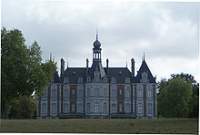
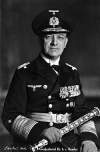


2. Measures for increasing and speeding up the supplies of planes, tanks and other kinds of war materials from the United States to the Soviet Union.
3. Fundamental problems of cooperation of the Soviet Union and the United States in safeguarding peace and security to the freedom-loving peoples after the war.


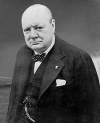

SEYSS-INQUART: Yesterday I stated that, after learning of Heydrich's order, I requested Bormann to inquire of the Fuehrer whether Heydrich actually had such unlimited power. Bormann confirmed this. [For the full text of today's proceedings, Click here.]
But that kind of sympathetic understanding needs to be compared with Seyss-Inquart's offer in 1943 to Dutch Jews who had mixed marriages to choose between Auschwitz and sterilization. His testimony did not leave a good impression . . . . The only defence Seyss-Inquart had been able to give was that his administration in Holland could have been worse. He might be satisfied to compare himself against [Hans] Frank in Poland or Koch in the Ukraine; the Tribunal must measure him against the law. 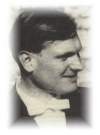
levi.bookin@gmail.com










Fair Use Notice: This site may contain copyrighted material the use of which has not always been specifically authorized by the copyright owner. We are making such material available in our efforts to advance understanding of historical, political, human rights, economic, democracy, scientific, environmental, and social justice issues, etc. We believe this constitutes a "fair use" of any such copyrighted material as provided for in section 107 of the US Copyright Law. In accordance with Title 17 U.S.C. Section 107, the material on this site is distributed without profit to those who have expressed a prior interest in receiving the included information for research and educational purposes. If you wish to use copyrighted material from this site for purposes of your own that go beyond 'fair use', you must obtain permission from the copyright owner.
Please Note: The list-owner and moderators of 3rdReichStudies are not responsible for, and do not necessarily approve of, the random ads placed on our pages by our web server. They are, unfortunately, the price one pays for a 'free' website.